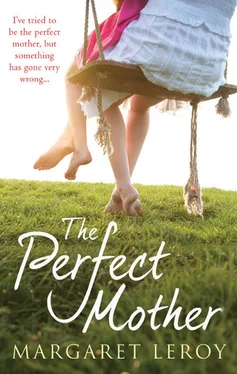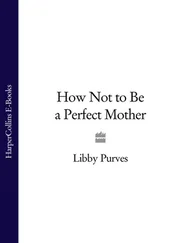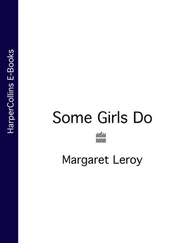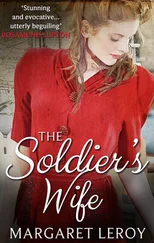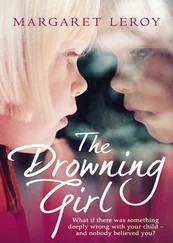Nicky is next to Richard, talking to the man with the unruly hair. She’s getting in close—not surprising, really, he’s quite attractive. Now that she’s taken off her coat, she looks like a picture from a magazine. There’s something altogether contemporary about Nicky. She loves biker boots and little tartan skirts, and she works at an advertising agency, where, in spite of—or maybe because of—the niceness and easygoingness of Neil, her husband, who is an inventive cook and a devoted parent, she exchanges erotic e-mails with the creative director. ‘You see, we’re not like you and Richard,’ she says to me sometimes, leaning across the table at the Café Rouge towards me. ‘You two are so transparently everything to each other. I mean, it’s wonderful if you can be like that—if you’ve got that kind of marriage—what could be lovelier? But Neil and I aren’t like that, especially since the kids. I don’t think I’m built to be completely faithful, it’s just not in my genes…’
She feels my eyes on her. She turns, speaks to the man again. They come towards me. Kate’s mother and Natalie’s mother move away.
He smiles at me. His eyes are grey and steady. Nicky puts her hand on my arm.
‘Meet Fergal,’ she says. ‘Our latest recruit. A tenor. Tenors are like gold dust. I love my tenors to bits.’
I smile. He says hello. I remember how much I like Irish voices.
She takes her last bite of apple-cake and licks her sugary fingers. ‘Catriona, your cooking is out of this world. I have to have more of this.’
Sinead walks past with a plate. Nicky lunges after her.
My boots have high heels and my eyes are just on a level with his. We look at one another and there’s a brief embarrassed pause.
‘I liked the carols,’ I tell him. Then think how vacuous this sounds.
‘Well,’ he says, and shrugs a little. ‘It’s been fun.’
I note the past tense. I rapidly decide that he’s not the sort of man who’d like me. I know how I must seem to him, a privileged sheltered woman.
‘Nicky’s good at arranging things,’ I say. ‘Making things happen.’
He nods vaguely. He’s looking over my shoulder—I’ve bored him already.
But then I see he is looking at my picture—the painting of poppies that I hung on the wall. It’s just behind me.
‘Who did the painting?’ he says.
‘I did.’
‘I wondered if it was you,’ he says. ‘I like it.’
I feel a little embarrassed, but acknowledge to myself that I am quite pleased with this painting. The petals are that dark purple that is almost black, yet there’s a gleam on them.
‘I don’t do much,’ I say. ‘It just makes a nice break. I can hide away in my attic and the girls know not to disturb me. I suppose it’s a bit conceited to put it up on the wall.’
‘D’you always do that?’ he says.
‘Do what?’
‘Run yourself down like that?’
‘Probably. I guess it’s irritating.’
We both smile.
‘When you paint, is it always flowers?’ he says.
‘Always. I can’t do people. I’m really limited.’
He looks at me quizzically. His eyes are full of laughter.
‘OK, I know I’m doing it again,’ I say. ‘But it’s true. And I can’t draw out of my head either. It has to be something I can put on the table in front of me. I can only paint what I see.’
‘D’you sell them?’ he says.
I nod, flattered he should ask. ‘There’s a gift shop in town that takes them sometimes.’
He turns to look at it again. ‘It’s not very cheerful. For a flower. It’s kind of ominous. All that shadow around it.’
‘Really. How can you read all that into a picture?’ But I’m pleased. There’s something rather trivial about doing paintings of flowers and selling them in a gift shop alongside scented candles and boxed sets of soap. I like that he can see a kind of darkness in it.
I realise I am happy. My body fluid and easy with the wine, my room hospitable, beautiful, this man with the Irish lilt in his voice approving of my picture; this is easy, this is how things should be.
He’s looking at me with those steady grey eyes. There’s something in his look that I can’t work out: sex, or something else, more obscure, more troubling.
‘I know you,’ he says suddenly. ‘Don’t I?’
I laugh politely. ‘I don’t think so.’
Someone is leaving. The door opens, the cold and the night come in.
‘I do,’ he says. ‘I’m sure I know you. I recognise your face.’
He’s staring at me, trying to work it out. It sounds like a come-on, but his look is puzzled, serious. The fear that is never far from me lays its cold hand on my skin.
‘Well, I don’t know where you could have seen me.’ My voice is casual, light. ‘Perhaps the school gate at St Mark’s? Daisy goes there.’ But I know this isn’t right, I know I’d have noticed him. ‘Nicky says that’s where your little boy goes,’ I add, trying to drag the conversation away to somewhere safe.
He shakes his head. ‘Jamie doesn’t start till after Christmas.’
‘You’ll like it,’ I tell him. ‘Daisy’s eight, she’s in year three, she has the nicest teacher…’
But he won’t let it rest. ‘Where d’you work?’ he says.
‘I don’t.’ Then, biting back the urge to apologise for my life, which must sound so passive—‘I mean, not outside the home. I used to work in a nursery school before I got married. But that’s ages ago now.’
‘It wasn’t there. Forget it. It doesn’t matter.’
But I’m upset and he knows it. He tries to carry on, he asks what I’m painting now, but the mood is spoilt, it can’t be restored or recovered. As soon as he decently can, he leaves me. All evening I feel troubled: even when the singers have gone, calling out their thanks and Christmas wishes, setting off into the snow which is falling more thickly now, casting its nets over everything, under the chill thin light of the moon of beginnings.
We stand there in the suddenly quiet room. It looks banal now. There are cake crumbs on the carpet, and every glass has a purplish, spicy sediment.
‘I’ll do the washing-up,’ says Richard.
Normally I’d say, No, let me, you sit down, but tonight I give in gratefully. Sinead goes to help him.
I turn off the light again, and the firelight plays on every shiny surface. My living room seems like a room from another time. I stretch out on the sofa. Daisy comes and folds herself into me. Her limbs are loose, heavy, her skin is hot and dry; I feel her tiredness seeping into me.
‘Did you enjoy it?’ I ask her.
To my surprise, she shakes her head. In the red erratic firelight, her face looks sharper, thinner. Little bright flames glitter in her eyes. Suddenly, without warning, she starts crying.
I hug her. ‘It’s ever so late,’ I tell her. ‘You’ll be fine in the morning.’ She rubs her damp face against me.
I don’t want her to go to sleep unhappy. I can never bear it when she’s sad—which is silly really, I know that, because children often cry, but I always rush in to smooth things over, want to keep everything perfect. So I try to distract her with shadow shapes, the animal patterns I learnt how to make from a booklet I bought from the toyshop in Covent Garden. I move my hands in the beam of light from the open door to the hall, casting shadows across the wall by the fireplace. I make the seagull, flapping my hands together; and the crab, my fingers hunched, so it sidles along the mantelpiece; and the alligator, snapping at the board games on the bookshelf. Daisy wipes her face and starts to smile.
I make the shape of the weasel; we wait and wait, Daisy holding her breath: this is her favourite. And just when you’ve stopped expecting it, it comes, the weasel’s pounce, down into some poor defenceless thing behind the skirting board.
Читать дальше
